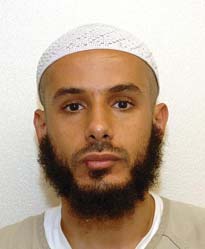An interagency review board has recommended that a Kuwaiti named Fouzi Khalid Abdullah Al Awda, who has been held at Guantanamo since early 2002, be transferred to his home country. Interestingly, prominent jihadists who are active on Twitter knew about the ruling hours before it was released to the public.
The tweet shown above was posted yesterday by a jihadist who uses the handle @strategyaffairs. The tweet offers a “a thousand congratulations to the Awda family” for “raising the issue of Guantanamo from the beginning.” Al Awda’s family has played a prominent role in challenging the detention of Fouzi and others in Cuba.
The congratulations was quickly retweeted by high-profile al Qaeda supporters and members, including Sanafi al Nasr, who is based in Syria and leads al Qaeda’s “Victory Committee.”
It is not clear how @strategyaffairs learned of the periodic review board’s ruling. After seeing the tweet, The Long War Journal went to the review board’s website and the ruling in al Awda’s matter had not yet been published. Since then, the board’s decision has been added to the website. However, the decision is dated July 14, so the news could have been leaked by someone in the know before the decision was released to the public 11 days later.
|
|
|
Fouzi Khalid Abdullah al Awda. |
In a leaked memo authored in January 2008, Joint Task Force Guantanamo (JTF-GTMO) deemed al Awda a “high” risk “to the US, its interests, and allies,” and recommended that the US continue to hold him.
In August 2009, a DC district court denied al Awda’s petition for a writ of habeas corpus, concluding that the US government “met its burden to show by a preponderance of the evidence that Al [Awda] became part of Taliban and al Qaeda forces.”
And in its final recommendations, delivered in January 2010, President Obama’s own Guantanamo Review Task Force slated al Awda for continued detention pursuant to the laws of war. That is, al Awda was one of the 48 detainees the task force determined were “too dangerous to transfer but not feasible for prosecution.”
Periodic review board’s decision
While other government bodies previously determined that al Awda was too dangerous to transfer or release, the periodic review board found that al Awda’s detention is no longer “necessary to protect against a continuing significant threat to the security ofthe United States.”
The review board cited al Awda’s “low level of training and lack of a leadership position in al Qaeda or the Taliban,” as well as his “personal commitment to participate fully in the Government of Kuwait’s rehabilitation program and comply with any security measures” as reasons for its decision. The board also cited al Awda’s “extensive family support,” “commitment not to support extremist groups or other groups that promote violence,” and “positive changes in” his “behavior while in detention.”
In addition, the review board says it “considered information provided by the Government of Kuwait that indicated its confidence in its legal authority to require and maintain” al Awda’s “participation in a rehabilitation program and commitment to implement robust security measures.”
In the past, the Kuwaiti government has failed to keep tabs on some ex-Guantanamo detainees. For instance, Abdullah Salih al Ajmi, who was transferred from Guantanamo to Kuwait in 2005, carried out a suicide bombing in Iraq in 2008. The Kuwaiti government’s assurances that it has the “commitment to implement robust security measures” in al Awda’s case may have been influenced by this experience.
The review board recommends that al Awda attend “at least one year of in-patient rehabilitation” and that a “comprehensive set of security measures” be implemented.
Habeas petition rejected in 2009
Some of the details of al Awda’s jihadist career can be found in the DC district court’s opinion rejecting his petition for a writ of habeas corpus. The court based its decision on al Awda’s admissions and other evidence.
According to the court, al Awda admitted that he met with a Taliban official, received training on an AK-47, “and that he traveled with his AK-47 into the Tora Bora mountains, remained in the Tora Bora mountains during the Battle of Tora Bora, and was captured shortly thereafter by border guards while still carrying his AK-47.”
The court also found that al Awda’s flight to Tora Bora in late 2001 was consistent with the behavior of other jihadists after Osama bin Laden ordered his forces to relocate there. The government presented credible evidence that al Awda was captured alongside an individual with significant ties to al Qaeda.
Although the court’s decision was based largely on al Awda’s admitted ties to the Taliban, there was also evidence tying him directly to al Qaeda’s operations.
The court considered the government’s argument that the facility al Awda was trained in was actually run by al Qaeda, and not the Taliban. Al Awda denied being trained by al Qaeda, but the court found it “was more likely than not” that the camp al Awda attended was Al Farouq, “al Qaeda’s primary Afghan basic training facility.” According to the court, however, this evidence was not necessary to justify al Awda’s detention, as his admissions alone were sufficient.
A “high” risk, according to Joint Task Force Guantanamo (JTF-GTMO)
A leaked memo authored by JTF-GTMO on Jan. 2, 2008 contains a number of additional allegations and pieces of intelligence that were not weighed in the DC district court’s ruling. JTF-GTMO found that al Awda may have had ties to senior al Qaeda leaders and ideologues.
In addition to his training at Al Farouq, JTF-GTMO concluded that al Awda attended a camp run by Lashkar-e-Taiba (LeT), a Pakistani jihadist group with longstanding connections to al Qaeda. The source for this finding was David Hicks, an Australian who was once one of al Awda’s fellow Guantanamo detainees.
Hicks allegedly told authorities that al Awda received training in an LeT camp. JTF-GTMO concluded that Hicks’ claim was consistent with al Awda’s “passport entry-exit stamp at Lahore,” Pakistan from April to May 2000. This timeline for al Awda’s travels was also consistent with the timing of Hicks’ own travels, according to the JTF-GTMO file. Hicks has admitted to training in an LeT camp.
Other allegations included in the JTF-GTMO file, based largely on the testimony of al Awda’s fellow detainees, include that he swore bayat (an oath of allegiance) to Osama bin Laden and had ties to an al Qaeda cell in the UK run by Abu Qatada (a notorious al Qaeda-linked cleric).
The Kuwaiti State Security also reported that al Awda was “associated” with Sulayman Abu Ghaith, who served as al Qaeda’s spokesman and was convicted on terrorism charges by a New York court earlier this year.










2 Comments
How many of these Guantanamo-releasees do we have to recapture on the battlefield before this parole doesn’t seem like the world’s greatest idea?
Plainly they are getting their news from the White House.
The President, himself, monitors all of these cases. It’s always been a big issue for him, personally.
He’s constantly getting heat from the Left over the existence of Gitmo.
The actual last word on all of these releases comes from the President, himself. He doesn’t want to release anyone that would create political blow-back.
The jihadists have no end of links to the professional Left in America. (Visit any march in Berkeley to see them hook up.)
In a world of instant messaging, transmissions via these social networks fly faster than all traditional mechanisms.
One should expect that most of new history — and miss information — shall come by way of twitter. It’s that fast; it’s that connecting.